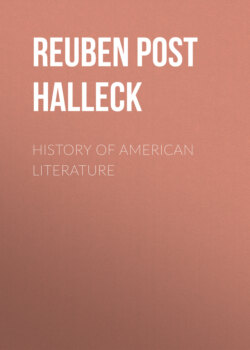Читать книгу History of American Literature - Reuben Post Halleck - Страница 16
На сайте Литреса книга снята с продажи.
SAMUEL SEWALL, 1652–1730
ОглавлениеThere was born in 1652 at Bishopstoke, Hampshire, England, a boy who sailed for New England when he was nine years old, and who became our greatest colonial diarist. This was Samuel Sewall, who graduated from Harvard in 1671 and finally became chief justice of Massachusetts.
[Illustration: SAMUEL SEWALL]
His Diary runs with some breaks from 1673 to 1729, the year before his death. Good diaries are scarce in any literature. Those who keep them seldom commit to writing many of the most interesting events and secrets of their lives. This failing makes the majority of diaries and memoirs very dry, but this fault cannot be found with Samuel Sewall. His Diary will more and more prove a mine of wealth to the future writers of our literature, to our dramatists, novelists, poets, as well as to our historians. The early chronicles and stories on which Shakespeare founded many of his plays were no more serviceable to him than this Diary may prove to a coming American writer with a genius like Hawthorne's.
In Sewall's Diary we at once feel that we are close to life. The following entry brings us face to face with the children in a Puritan household:—
"Nov. 6, 1692. Joseph threw a knop of brass and hit his sister Betty on the forehead so as to make it bleed and swell; upon which, and for his playing at Prayer-time, and eating when Return Thanks, I whipped him pretty smartly. When I first went in (called by his Grandmother) he sought to shadow and hide himself from me behind the head of the cradle: which gave me the sorrowful remembrance of Adam's carriage."
Sewall was one of the seven judges who sentenced nineteen persons to be put to death for witchcraft at Salem. After this terrible delusion had passed, he had the manliness to rise in church before all the members, and after acknowledging "the blame and shame of his decision," call for "prayers that God who has an unlimited authority would pardon that sin."
Sewall's Diary is best known for its faithful chronicle of his courtship of Mrs. Catharine Winthrop. Both had been married twice before, and both had grown children. He was sixty-nine and she fifty-six. No record of any other Puritan courtship so unique as this has been given to the world. He began his formal courtship of Mrs. Winthrop, October 1, 1720. His Diary contains records of each visit, of what they said to each other, of the Sermons, cake, and gingerbread that he gave her, of the healths that he drank to her, the lump of sugar that she gave him, of how they "went into the best room, and clos'd the shutters."
"Nov. 2. Gave her about ½ pound of sugar almonds, cost 3 shillings per [pound]. Carried them on Monday. She seem'd pleas'd with them, ask'd what they cost. Spake of giving her a hundred pounds per annum if I died before her. Ask'd her what sum she would give me, if she should die first?"
"Monday, Nov. 7. I went to Mad. Winthrop; found her rocking her little Katy in the cradle. I excused my coming so late (near eight). She set me an arm'd chair and cushion; and so the cradle was between her arm'd chair and mine. Gave her the remnant of my almonds. She did not eat of them as before. … The fire was come to one short brand besides the block, which brand was set up in end; at last it fell to pieces and no recruit was made. … Took leave of her. … Her dress was not so clean as sometime it had been. Jehovah jireh!"
Acute men have written essays to account for the aristocratic Mrs. Winthrop's refusal of Chief-Justice Sewall. Some have said that it was due to his aversion to slavery and to his refusal to allow her to keep her slaves. This episode is only a small part of a rich storehouse. The greater part of the Diary contains only the raw materials of literature, yet some of it is real literature, and it ranks among the great diaries of the world.
